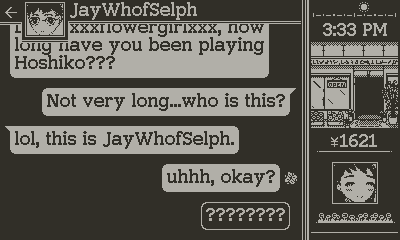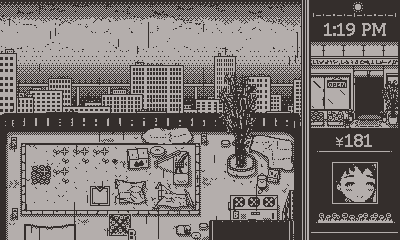Building Games for a Crank
Playdate developers, RNG Party Games, discuss the imminent release of Bloom and their experience creating it

The curious Playdate (a quirky black and white retro-inspired console by Panic Inc.) is due to find its way into player's hands imminently (thanks to a recent announcement from Panic about its plan to ship the first group of consoles soon).
Every Monday, Playdate owners will receive two new games as part of the console's "first season". Third-party developers are hard at work building the games that will roll out as part of these updates. Bloom, a real-time narrative-driven social sim by RNG Party Studio, will be the very first commercial Playdate game from the developer preview.
Source: RNG Party Studio's YouTube channel.
Meet the team
The RNG Party team is made up of Peyton, Jake, and Ben. In my recent conversation with the trio, we discussed the birth of the indie studio and the development of Bloom - along with all the challenges that accompany a team working part-time on a game.
Jake is responsible for code/design, Ben for art/writing/sound, and Peyton for art/writing. But as Ben said to me, "In a team as small as this, there's always a bit of grey area in who ends up doing what."
So in reality, the lines are blurred. Ben was initially producing the art for Bloom, with assistance from Peyton. But their styles often clashed, so Peyton's art was used as stand-in work for 'beta' which Ben refined and finalised. As Peyton put it, "at the same time, I added some stuff to his original designs to improve or fix them."
"Similarly, while I know literally nothing about programming, I think Ben knows enough to at least be a sounding board for Jake. And Jake and I know enough about music and sound design to at least know when something is off or whatever," he said.
The game design of Bloom is especially collaborative.
Team beginnings
The team didn't actually start life as RNG Party Games. The convergence into a studio was, in fact, a gradual process.
Ben experimented with solo development for years, but found that "it wasn't working out on my own." Meanwhile, right after graduating University, Peyton was looking for something to do outside teaching. "I knew Ben had been working on a game and that was something I had always been interested in trying to do. I offered to work with him to assist with art and stuff,” he said.
Ben and Peyton then found they weren’t suited to programming a game. This led to Peyton reaching out to Jake, having gone to the same high school, to bring him on around 2016.
Peyton explained how that project was scrapped soon after, and then a few more after that, until Backspace Bouken was made.
"That was probably nearing completion by the time we formally created RNG Party," he said.
Ludum Dare 49
The first version of Bloom debuted last year, as a part of Ludum Dare 49 (a weekend-long game jam). That version was created by Jake and Ben, and while Peyton wasn’t able to participate due to other obligations he was brought on a little later.
While RNG Party Games was accepted into the Playdate’s Developer Preview program a couple of years ago, both Jake and Ben used Ludum Dare to try out something new.
"Both Jake and I had toyed with the idea of making an idle game, so I took that idea and combined it with my want for trying my hand at writing a story I cared about, and that ended up making Bloom," Ben said.
The idea of an "idle game" had been "stuck in [Jake’s] head for months" but found he couldn’t do the writing. So, they took the opportunity to use the strict time limit of the Ludum Dare (ignoring the theme) to create a rapid prototype.
This environment also informed the game design, "we went with a texting-based story both because it kept scope down and because it felt like a good way to ease me into writing," Ben explained describing how this was his first project writing in a significant way.
Development challenges
The final story draft for Bloom was completed mere months ahead of the game going gold. The coding challenges that accompany incorporation of a 17,000 word story were persistent throughout the development cycle. "This really was just because I'm not at all used to writing on the scale required for this game and it took me far longer than I expected, as did editing afterward," Ben said.

This created a challenge for Jake in memory performance, due to the text being displayed in a "messenger" style app that allows you to scroll through it all at once.
"My background and day job involve much higher level Unity/VR development so CPU/memory optimization is not something I do very often. Bloom deals with enormous amounts of text, and figuring out how to store & display it while keeping the interface smooth and responsive was a big puzzle that I fought with for pretty much the entire dev cycle," he said.
Due to the Playdate having 16MB of RAM, "most games will have a lot more of a memory surplus than CPU cycles," Jake explained. "For this reason we eventually opted to store large image buffers in memory containing the text in order to minimize how often we drew it on the screen. This increased the framerate and overall responsiveness of the game at the cost of a longer initial load time, but I think it was worth it."

Both Ben and Peyton initially found 1-bit art challenging, needing to work within the restrictions to communicate shape and detail. And dithering was not something Peyton had previously done.
The art was also challenging due to the Playdate screen’s low pixel density: it requires UI elements such as text to be quite large in order to be legible. "Many many times we'd mockup UI for something and then have to go back and redo it 5 or 6 times in order to get everything in a usable size and position," Peyton said.
Sound even posed a challenge due to the frequency response of the Playdate’s speakers being different to that of most computers. Ben ended up having to make a version of the songs for hardware and another for online playback. "Certain types of sounds are a lot louder than others, so I had to compensate for that in order to make everything still sound good," he said.
Simultaneous release
The decision to release Bloom alongside the shipment of the Playdate was intentional. It's inbuilt into the design of the game. Ben explained that the decision was designed to compliment the behaviour Panic had already planned for with the Playdate.
"Bloom is a real-time ‘check back in’ a few times a day thing, which is something you'll definitely be doing with the Playdate already. So Bloom encourages people to do more of what they already will hopefully want to do. We also just wanted a game at launch regardless, since we'd been in the developer preview for a while," he said.
However, the team did not know when the Playdate was going to ship, so they had to plan for an unknown date. Peyton said, "We basically just set a date on the calendar to have the game feature complete and had various checklists of stuff. We all worked through that stuff in the evenings and on weekends and made it work."
Ben explained the process mirrored that of game jams: "We're sort of used to short bursts of doing a lot of work and then long spans of time of doing not that much or nothing. We've done a lot of game jams, which helped us get used to that."
Between Jake being a VR software dev, Ben working in IT, and Peyton working as a lawyer many hours of work had to be put in when they could. The biggest crunch, as Peyton and Ben explained, was the story.
"The story definitely did not stay on track, honestly. It exceeded multiple deadlines. But I felt strongly about doing it and doing it well, so put in the time I had to to get it done," Ben said.
The Playdate getting delayed allowed them to increase the scope of the game and work at their own pace. "It also helps that we did half the design work in the first 72 hours," Jake said.
Looking forward
While Playdate preorder holders may be excited to finally have the console, the RNG Party Team are excited for people to experience the game. They hope Bloom will serve as a showcase for other third-party devs. "My big wish is just that the indie dev scene/market for [the Playdate] stays around for a long time. Maybe even Bloom will serve as a showcase for what kind of stuff can be done from a hobbyist angle and hopefully many more will come along and make bigger and better third party games," Jake explained. Bloom is available to preorder right now on itch.io.
